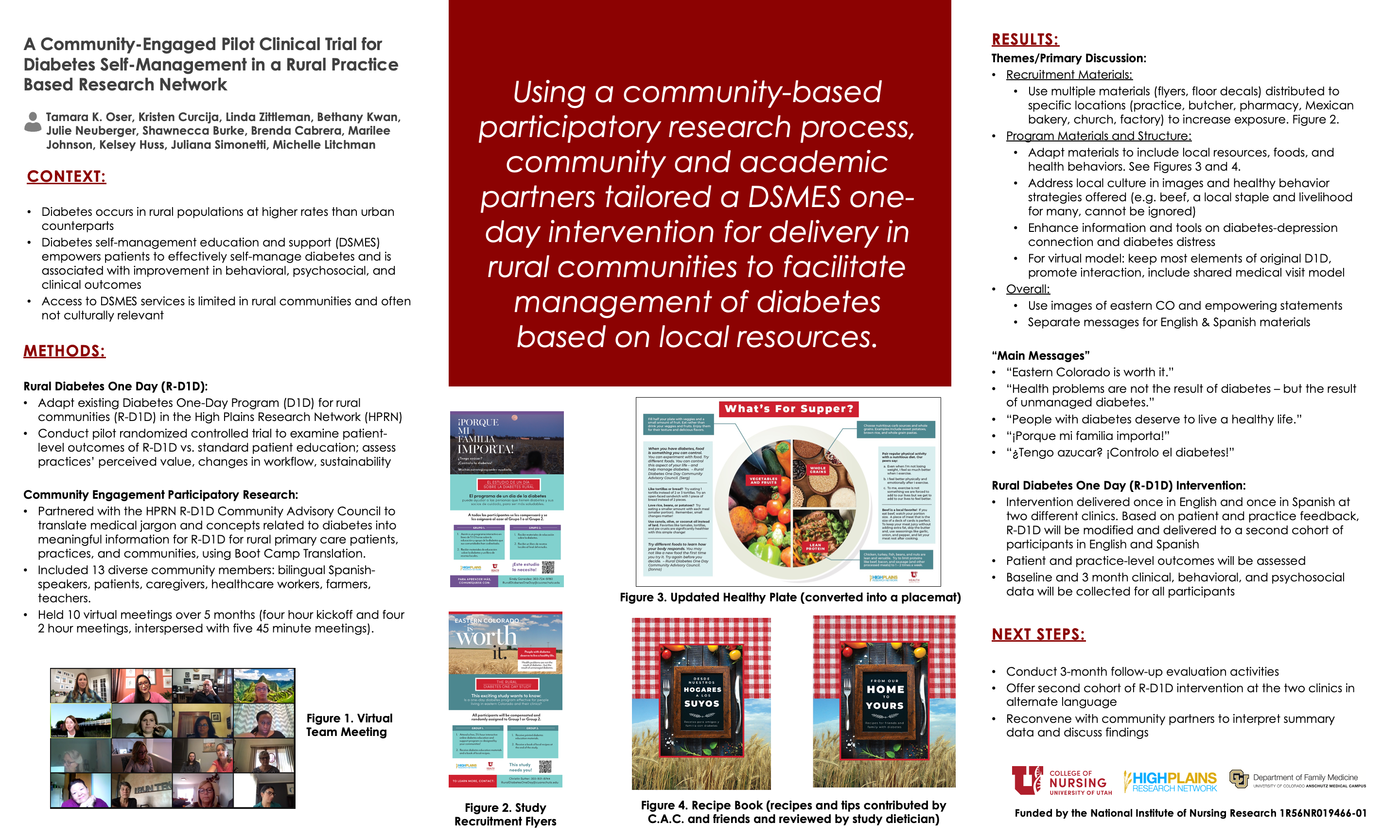PRP003: A Community-Engaged Pilot Clinical Trial for Diabetes Self-Management in a Rural Practice Based Research Network
Tamara Oser, MD; julie Neuberger; Brenda Cabrera, Bachelor of Arts; Marilee Johnson; Kelsey Huss, MS; Linda Zittleman, MSPH; Michelle Litchman; Kristen Curcija, MPH; Shawnecca Burke, MD; Bethany Kwan, PhD, MSPH; Juliana Simonetti
Abstract
Context: Over 34 million people in the United States have diabetes, with 1.5 million new diagnoses every year. Diabetes occurs in rural populations at higher rates than urban counterparts. Diabetes self-management education and support (DSMES) is associated with improvements in clinical, behavioral, and psychosocial outcomes yet is often not accessible to rural populations. Objective: The Rural Diabetes One Day (R-D1D) Study aims to adapt, implement, and evaluate a multidisciplinary DSMES program that encourages care partner and peer support to improve A1C and diabetes self-management for patients living in rural communities. Study Design: Pilot randomized control trial (RCT). Setting: In partnership with the University of Utah, the study is set in the High Plains Research Network of rural eastern Colorado. Population studied: Patients from HPRN practices, one hospital-based and one Federally Qualified Health Center, and practice clinicians and staff. Intervention: Using the Boot Camp Translation process, diverse community members and academic researchers adapted diabetes self-management language, materials, and delivery of an existing DSMES program (D1D) into a culturally relevant Rural-D1D for rural primary care practices, patients, and care partners. Participants will be randomized to R-D1D or control group (N=32 per arm). Participant recruitment begins in June 2021. Outcome Measures: Clinical and diabetes psychosocial outcomes will be assessed. Interviews and surveys with providers, staff, and patients will evaluate implementation, reach, and effectiveness. Results: The community-academic partnership developed messages and materials to supplement the existing D1D materials, including enhanced information on the connection between diabetes and depression; initiating conversations with care team about mental health; diabetes distress; and the concept of control primarily related to food, created a new recipe book, and adapted the structure of the R-D1D program. Preliminary program implementation (acceptability, feasibility of R-D1D) and patient-level reach and effectiveness (participant characteristics and preliminary changes in A1C and diabetes distress) will be reported
Conclusions: While providing preliminary data for a fully powered RCT, this study ensures the rural primary care experience is included in clinical trials that aim to improve health outcomes for English- and Spanish-speaking adults with diabetes living in rural areas.
Conclusions: While providing preliminary data for a fully powered RCT, this study ensures the rural primary care experience is included in clinical trials that aim to improve health outcomes for English- and Spanish-speaking adults with diabetes living in rural areas.

Brenda Andreas
11/20/2021Great idea. Living in rural a resource like this is invaluable.